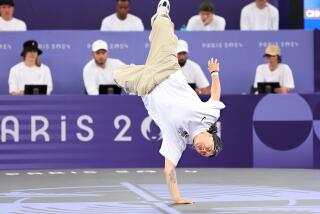No trips on this night fantastic
- Share via
From Vancouver, Canada — Tears again filled the house that two days ago held so much pain.
Only this time, they were tears of amazement, of wonder, of joy.
This time, a figure skater wept gold, Korea’s Kim Yuna setting a world record in both points and strength of standing ovation, spinning into history with an Olympic championship that will reverberate from Seoul to Los Angeles.
Did you see it? Could you feel it? The breeze from hundreds of Korean flags that filled the Pacific Coliseum is still whipping through these Pacific Rim streets.
If this were a football game, Kim would have won by five touchdowns. If this were a baseball game, it would have been called after five innings.
With all the pressure of the Olympics weighing on the No. 1 skater in the world, Kim spun as if weightless and soared as if winged.
And, oh, yeah, she later cried like a 19-year-old Bucheon girl who had just discovered that gold in a box on her birthday.
Kim finished her record 150.06 performance by screaming and weeping, her hand over her mouth, her eyes like saucers. Beyond the boards, her coach, Brian Orser, acted as if he had just scored those five touchdowns, running up and down with his fists pumping.
“I didn’t think I was going to cry,” Kim said later. “I honestly don’t know why I cried. Maybe I was relieved, maybe I was satisfied with my performance.”
Or maybe that’s how an athlete reacts when she has skated circles around the best in the world on the world’s biggest stage
Breaking her old free-skate world record by nearly 17 points, eventually winning the competition by a stunning 23 points, Kim was that good.
And, it turns out, that intimidating.
Entering the free skate, Kim was in first place ahead of Japanese rival Mao Asada. As fate would have it, in Thursday’s final group, Kim skated right before Asada.
What happened next could properly be called blue-sequined trash talk.
Kim was so graceful, powerful and precise, Asada was basically finished before she ever took the ice.
And sure enough, though Asada perfectly landed two triple axels that Kim did not attempt, Asada’s desperation led her to one two-footed landing, a near fall during footwork, and a single toe loop when a triple was planned.
“Halfway through, I just decided I had to go for it and finish strong,” said Asada, who is only 20 days younger than Kim.
Whatever, the Korean woman basically Zamboni-ed the Japanese woman, no doubt bringing a measure of satisfaction to fellow Koreans whose history includes a dubious Olympic fact.
Did you know that Korea’s first Olympic gold medal, won by marathoner Sohn Kee-Chung in Berlin in 1936, was actually awarded to the Japanese team? This is because at the time, Korea was under Japanese rule and Sohn competed under the Japanese name of Son Kitei.
Kim wasn’t sharing this medal, or moment, with anyone. While Kim beamed on the podium, the runner-up Asada initially grimaced. While Kim floated around the ice in the victory lap, Asada followed with the same tight grin.
While Asada showed the toughness of the defeat -- “I have regrets,” she said -- Kim showed the youthful coolness of victory.
On the medal stand, she put her hand over her heart and actually tried to sing her national anthem. In the media area, while carrying her gold medal in one hand, she carried her athlete’s credential in the other, as if worried that nobody would believe her.
“I can’t believe I won the Olympics,” she said, repeating the name of the competition as if to make it real.
This was Kim’s show, her moment, although Thursday was a reminder that a piece of this competition still belonged to Joannie Rochette, the Canadian skater whose mother, Therese, died of a heart attack Sunday night.
In Tuesday’s short program, the arena was filled with tears, many from Rochette herself, as she bravely completed her routine in honor of her mother’s memory. On Thursday, Rochette was showered with more standing ovations and responded with another strong effort despite struggling with a couple of landings.
This time, when Rochette finished, she seemed more relieved than sad, blowing a kiss into the sky, then blowing kisses of thanks to the crowd. For her, wining a bronze should have been as good as a gold, considering she was a champion simply for showing up.
“To be honest with you, I tried to be cold when I stepped on the ice,” Rochette later said in her first interview since her mother’s death. “I know that sounds bad, but I had to be in a fighting mood, a competition mood.”
She added, “That last triple salchow, I’m sure my mom was there lifting me up because I had no legs left.”
There was no way anybody here was catching Kim, who gave Korea its first figure skating medal while helping push all metal beyond the reach of the Americans, who failed to medal in this event for the first time in 46 years.
The American future is there -- Arcadia’s Mirai Nagasu, 16, had a strong free skate to finish fourth. But for now, it’s about Korea and Kim who, when skating toward the podium, was showered with the words of a fan yelling, “I love you!”
On a night when Kim Yuna locked the skating world in an elegant, emotional embrace, she returned the sentiment.
twitter.com/billplaschke
More to Read
Go beyond the scoreboard
Get the latest on L.A.'s teams in the daily Sports Report newsletter.
You may occasionally receive promotional content from the Los Angeles Times.








